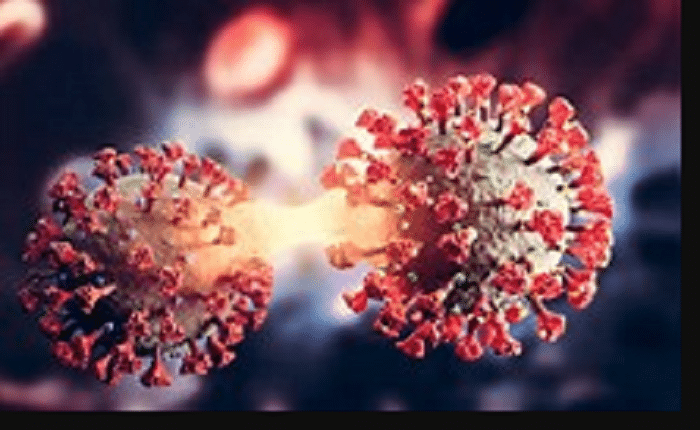Covid Variant ERIS Symptoms: As the COVID-19 pandemic continues to evolve, new variants of the virus are emerging. One of the latest variants is the ERIS variant, also known as EG.5. This variant has been identified in several countries, including the United States, and is believed to be more contagious than previous strains of the virus. In this article, we will explore the symptoms of the ERIS variant and what you need to know to protect yourself and others.
Understanding the ERIS Variant is crucial to understanding the symptoms that come with it. According to the Centers for Disease Control and Prevention (CDC), the ERIS variant is a subvariant of the Delta variant, which was first identified in India. Like other variants of the virus, ERIS has mutations that make it more transmissible than previous strains. As a result, it is essential to identify the symptoms of the ERIS variant early on to prevent its spread.

Identifying Symptoms of the ERIS variant can be challenging because they are similar to those of other COVID-19 strains. However, the most common symptoms of the ERIS variant include changes in taste or smell, coughing, sore throat, runny or stuffy nose, headache, fatigue, sneezing, and congestion. If you experience any of these symptoms, it is crucial to get tested for COVID-19 and follow the recommended protocols to prevent the spread of the virus.
Key Takeaways – Covid Variant ERIS Symptoms:
- The ERIS variant is a subvariant of the Delta variant and is more transmissible than previous strains of the virus.
- Symptoms of the ERIS variant include changes in taste or smell, coughing, sore throat, runny or stuffy nose, headache, fatigue, sneezing, and congestion.
- Identifying symptoms early on and following recommended protocols can help prevent the spread of the ERIS variant.
Understanding Covid ERIS Variant – Symptoms:
The ERIS variant, also known as EG.5, is a new strain of the COVID-19 virus that is currently sweeping across the United States. This fast-spreading variant was first identified in China in February 2023 and was detected in the US in April of the same year. Currently, it accounts for more than 17% of COVID-19 cases nationwide, making it the most dominant variant in the country.
Like other COVID-19 variants, the ERIS variant can cause a range of symptoms that may vary in severity. According to Yahoo News, the most common symptoms of ERIS include:
Common Covid Variant ERIS Symptoms:
- Runny or stuffy nose
- Headache
- Fatigue
- Sneezing
- Sore throat
- Coughing
- Changes to a sense of smell
It is important to note that these symptoms may also be present in other COVID-19 variants, so it is essential to get tested to confirm the presence of the ERIS variant.
While the ERIS variant is currently dominating COVID-19 cases in the US, it is not yet clear how dangerous it is compared to other variants. However, it is believed that the variant is more transmissible than previous strains, which means that it can spread more easily from person to person.
To protect yourself and others from the ERIS variant, it is essential to follow the recommended guidelines from health authorities. This includes getting vaccinated, wearing a mask in public indoor settings, practicing social distancing, washing your hands frequently, and staying home if you feel unwell.
In summary, the ERIS variant is a new strain of the COVID-19 virus that is currently the dominant variant in the United States. It can cause a range of symptoms, including changes in the sense of smell, coughing, and fatigue. While it is not yet clear how dangerous the variant is, it is believed to be more transmissible than previous strains. To protect yourself and others, it is essential to follow the recommended guidelines from health authorities.
Identifying Symptoms – Covid Variant ERIS Symptoms:
As with other COVID-19 variants, early symptoms of the ERIS variant may include:
- Changes to or loss of sense of smell
- Changes to or loss of sense of taste
- Chills
- Congestion
- Diarrhea
- Dry cough
- Fatigue
- Fever
- Headache
- Muscle or body aches
- Nausea or vomiting
- Shortness of breath
- Sore throat
- Stuffy or runny nose
It is important to note that not everyone infected with the ERIS variant will experience all of these symptoms and some may not experience any symptoms at all. Additionally, some symptoms may be more severe than others and may require medical attention.
If you experience any of these symptoms, it is important to get tested for COVID-19 as soon as possible. Testing can help identify the presence of the ERIS variant or other variants of the virus, which can help inform treatment and prevention efforts.
It is also important to continue practicing preventative measures, such as wearing a mask, washing your hands frequently, practicing social distancing, and getting vaccinated if eligible. These measures can help reduce the spread of the ERIS variant and other variants of the virus.
Comparing ERIS To Other Variants – Covid Variant ERIS Symptoms:
As the new COVID variant ERIS continues to spread, many people are wondering how it compares to other variants of the virus. Here, we will compare ERIS to other well-known variants such as Delta and Omicron.
Symptoms:
The symptoms of ERIS are similar to those of other COVID variants, including cough, shortness of breath, fatigue, and changes to or loss of sense of smell and taste [^1][^2]. However, ERIS has been reported to cause more congestion and sneezing than other variants [^2].
Transmission:
ERIS is highly contagious and spreads easily from person to person, much like other COVID variants [^3]. However, it is important to note that the level of transmission can vary depending on factors such as vaccination rates and public health measures.
Severity:
Currently, there is limited data on the severity of ERIS compared to other variants [^1]. However, early reports suggest that ERIS may cause more severe disease than Delta [^2]. It is important to note that the severity of the disease can vary depending on factors such as age, underlying health conditions, and vaccination status.
Vaccines:
While it is still too early to know for certain, early studies suggest that current COVID vaccines may provide some protection against ERIS [^1][^3]. However, it is important to continue to follow public health guidelines, such as wearing masks and practicing social distancing, to help prevent the spread of the virus and protect ourselves and our communities.
In summary, while there is still much to be learned about ERIS, it is important to continue to follow public health guidelines and get vaccinated to help prevent the spread of the virus and protect ourselves and our communities.
Severity Of ERIS Symptoms – Covid Variant ERIS:
The severity of ERIS symptoms varies from person to person, with some experiencing mild symptoms and others experiencing more severe symptoms. According to New Scientist, early symptoms of the ERIS variant may include changes to or loss of sense of smell, changes to or loss of sense of taste, chills, congestion, diarrhea, dry cough, fatigue, fever, headache, muscle aches, and sore throat. These symptoms are similar to those of other COVID-19 variants.
While some people may only experience mild symptoms, others may experience more severe symptoms that require hospitalization. According to Reuters, the EG.5 “Eris” coronavirus subvariant may cause more severe disease than past versions of the virus. However, more research is needed to confirm this.
It is important to note that the severity of ERIS symptoms may also depend on a person’s age, underlying health conditions, and vaccination status. Vaccines have been shown to reduce the severity of COVID-19 symptoms, including those caused by the ERIS variant. Therefore, it is important to get vaccinated to protect oneself and others from COVID-19.
In summary, the severity of ERIS symptoms can vary from person to person, with some experiencing mild symptoms and others experiencing more severe symptoms that may require hospitalization. The best way to protect oneself and others from COVID-19 is to get vaccinated and follow public health guidelines.
Long-Term Effects Of ERIS – Covid Variant ERIS Symptoms:
The long-term effects of the ERIS variant are not yet fully understood. However, it is important to note that COVID-19, in general, can have long-term effects on the body. Some people who have had COVID-19 have reported experiencing symptoms that persist for weeks or even months after their initial infection.
According to a study published in the Journal of the American Medical Association, people who had COVID-19 reported experiencing a range of symptoms that persisted for up to six months after their initial infection. These symptoms included fatigue, shortness of breath, joint pain, chest pain, and difficulty sleeping.
It is not yet clear whether the ERIS variant has any unique long-term effects. However, given the severity of the symptoms associated with the variant, it is possible that people who contract ERIS may experience long-term effects similar to those experienced by people who have had COVID-19.
It is important to note that vaccination can significantly reduce the risk of long-term effects from COVID-19. Studies have shown that people who are vaccinated against COVID-19 are less likely to experience severe symptoms and are less likely to require hospitalization.
In conclusion, while the long-term effects of the ERIS variant are not yet fully understood, it is important to take steps to protect ourselves from COVID-19 in general. This includes getting vaccinated, wearing masks, practicing good hand hygiene, and avoiding large gatherings.
Prevention And Protection Against ERIS – Covid Variant ERIS Symptoms:
As with any COVID-19 variant, prevention and protection against ERIS is crucial to avoid getting infected and spreading the virus. Here are some measures that we can take to protect ourselves and others:
Wearing Masks:
Wearing a quality mask that blocks the ingestion of droplets is one of the most effective ways to prevent the spread of ERIS. Make sure that the mask fits snugly around your nose and mouth, and consider using a double mask for extra protection.
Practicing Social Distancing:
Maintaining a safe distance of at least six feet from others can help reduce the risk of exposure to ERIS. Avoid crowded places and gatherings, especially indoors, where the virus can easily spread.
Washing Hands:
Washing our hands frequently with soap and water for at least 20 seconds can help kill the virus that may be present in our hands. Use hand sanitizer when soap and water are not available.
Staying Home:
If you are feeling unwell or have symptoms of COVID-19, stay home and avoid contact with others. Get tested for COVID-19, and follow the advice of your healthcare provider.
Getting Vaccinated:
Getting vaccinated against COVID-19 is one of the most effective ways to protect against ERIS and other variants of the virus. Keep up to date with the latest guidance from health authorities on booster shots and other vaccination recommendations.
By following these measures, we can help protect ourselves and others from ERIS and other variants of COVID-19. Remember to stay informed and take action to protect your health and the health of those around you.
Treatment Options For Covid Variant ERIS – Symptoms:
Currently, there is no specific treatment for the ERIS variant of COVID-19. However, medical professionals recommend a few general measures to alleviate the symptoms and prevent complications.
Home remedies:
If you have mild symptoms, it is recommended to self-isolate and take care of yourself at home. Here are some home remedies that may help alleviate the symptoms:
- Get plenty of rest
- Drink lots of fluids to stay hydrated
- Use over-the-counter pain relievers such as acetaminophen or ibuprofen to reduce fever and alleviate body aches
- Gargle with warm salt water to soothe a sore throat
- Use a humidifier or take a steamy shower to ease congestion
Medical treatment:
If your symptoms are severe or if you have underlying health conditions that put you at risk of developing complications, seek medical attention immediately. Your doctor may recommend the following treatments:
- Oxygen therapy: If you have difficulty breathing, you may need supplemental oxygen to help you breathe easier.
- Steroids: In some cases, your doctor may prescribe corticosteroids to reduce inflammation in your lungs and other organs.
- Antiviral medication: There are currently no specific antiviral medications for the ERIS variant, but your doctor may prescribe other antiviral medications to help reduce the severity of your symptoms.
It is important to note that the best way to prevent the spread of the ERIS variant is to get vaccinated and follow public health guidelines such as wearing masks, practicing social distancing, and washing your hands frequently.
Global Impact Of Covid Variant ERIS – Symptoms:
The emergence of the new COVID variant, ERIS, has caused concern worldwide due to its fast-spreading nature and potential impact on public health. Here are some of the ways that ERIS is impacting the world:
- Increased Cases: ERIS has quickly become the dominant strain of COVID-19 in the United States and is spreading rapidly in other parts of the world. As of August 17, 2023, ERIS accounts for more than 17% of COVID-19 cases in the US, which is the most of any variant. This has led to a surge in hospitalizations and deaths in some areas.
- Travel Restrictions: Many countries have implemented travel restrictions and quarantine requirements for travelers from areas with high rates of ERIS transmission. This has disrupted travel plans and caused economic hardship for some individuals and businesses.
- Vaccine Effectiveness: There is some concern that the current COVID-19 vaccines may be less effective against ERIS. However, studies are ongoing to determine the level of protection provided by the vaccines against this variant.
- Healthcare System Strain: The rapid spread of ERIS has put a strain on healthcare systems around the world. Hospitals and medical facilities are struggling to keep up with the influx of patients, leading to shortages of staff, equipment, and supplies.
- Economic Impact: Although the global economy is still evaluating ERIS’s influence, it’s evident that the pandemic has already induced substantial economic upheaval. The continued spread of ERIS could lead to further economic hardship for individuals and businesses.
Overall, the emergence of ERIS highlights the ongoing need for continued vigilance and preparedness in the face of the COVID-19 pandemic. Individuals must persist in adhering to public health guidelines, while also getting vaccinated, to aid in reducing virus transmission and safeguarding themselves and their communities.
Frequently Asked Questions (FAQS) – Covid Variant ERIS Symptoms:
What are the symptoms of the latest Covid variant?
The latest Covid variant, ERIS, has symptoms similar to previous variants, such as coughing, fever, fatigue, and shortness of breath. However, according to the Centers for Disease Control and Prevention (CDC), ERIS may also cause sneezing, sore throat, and changes in the sense of smell.
How does the Covid variant ERIS differ from previous variants?
ERIS is a new variant of Covid that has emerged and becomes the dominant variant in the United States. According to the World Health Organization (WHO), ERIS has several mutations in the spike protein of the virus, which may make it more contagious and able to evade immune responses.
What is the prevalence of Covid variant ERIS in different countries?
Currently, ERIS is most prevalent in the United States, accounting for about 17% of Covid cases in the country during a two-week period in August 2023. However, it is important to note that the situation is constantly evolving, and prevalence rates may change over time.
More FAQS On Covid variant ERIS symptoms:
Are the Covid variant ERIS symptoms more severe than previous variants?
There is currently no evidence to suggest that ERIS causes more severe symptoms than previous variants. However, it is important to note that the severity of Covid symptoms can vary widely from person to person, and some individuals may experience more severe symptoms than others.
What are the recommended treatments for Covid variant ERIS?
The recommended treatments for Covid variant ERIS are similar to those for previous variants. These may include rest, hydration, over-the-counter pain relievers, and, in some cases, hospitalization for more severe cases. It is important to consult with a healthcare professional for personalized treatment recommendations.
How effective are current Covid vaccines against the ERIS variant?
Currently, we possess limited data regarding the efficacy of Covid vaccines against the ERIS variant. However, early studies suggest that vaccines may still provide some protection against ERIS, particularly in preventing severe illness and hospitalization. It is important to continue following recommended public health measures, such as wearing masks and practicing social distancing, even if vaccinated.
Conclusion – Covid Variant ERIS Symptoms:
In conclusion, the ERIS variant of COVID-19 has emerged as a new threat to public health. Researchers have discovered that this variant exhibits high contagiousness and can lead to severe symptoms in certain individuals. The most common symptoms of ERIS include runny or stuffy nose, headache, fatigue, sneezing, sore throat, coughing, changes to sense of smell, and diarrhea.
Please note that symptoms resembling those of other COVID-19 variants may occur with ERIS. If you encounter any of these symptoms, it is crucial to undergo testing. If you test positive for ERIS, it is important to self-isolate to prevent the spread of the virus to others.
To safeguard yourself and others from ERIS, the optimal approach is to receive vaccination. Studies have shown that the COVID-19 vaccines are effective against the ERIS variant. Apart from receiving vaccination, individuals should maintain good hygiene by frequently washing their hands, wearing masks in public indoor areas, and practicing social distancing.
As the situation with ERIS and other COVID-19 variants continues to evolve, it is important to stay informed and follow the guidance of public health officials. By working together, we can help prevent the spread of COVID-19 and protect ourselves and our communities.

